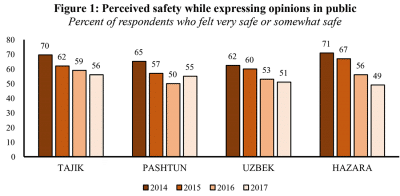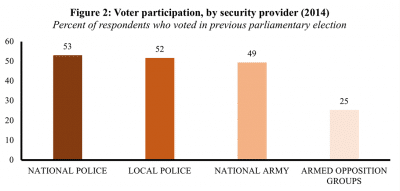June 20, 2018
Elections in Afghanistan, a hallmark of Western aid to that country, have been marred repeatedly by voter fraud. With the next round of parliamentary elections now delayed until October, fixing Afghanistan’s voter registry is an increasingly urgent priority for the Afghan government. But the success of democratic governance in Afghanistan is also threatened by Afghans’ declining sense of personal safety, particularly when expressing opinions in public. Because there is a direct link between perceived safety, willingness to speak freely in public, and the decision to vote, the government must find ways to address this insecurity for democratic elections and representative government to succeed in Afghanistan.
The collapse of the Taliban government in 2001 opened the door to a constellation of basic, democratic rights for Afghan citizens. Article 34 of the 2004 constitution, for example, states that freedom of expression, a cornerstone of democracy, “shall be inviolable.” As Western forces have reduced their presence, however, the Taliban has reasserted itself, demonstrating a surprising ability to conduct high-profile attacks. The result has been a growing fear among ordinary Afghans that they will face reprisal for public expressions of opinion.
This is clearly shown in results of the latest Survey of the Afghan People, The Asia Foundation’s pioneering, nationwide perceptions survey of Afghan adults, now entering its 14th year. The 2017 survey reveals that nearly half of all Afghans feel unsafe expressing opinions in public (44%). The proportion is higher in rural areas (45%) than urban areas (42%), and it varies by region, from 30% in the Central-Hazarajat region to a high of 50% in the Southeast who feel unsafe expressing opinions in public. With the exception of a slight uptick among Pashtuns in the latest survey, perceived safety has declined each year since 2014 among each of the four largest ethnic groups, with Hazaras reporting the most significant decline (figure 1). Among Afghans overall, those who felt safe expressing opinions in public dropped from 67% in 2014 to 54% in 2017.

Whatever its status in law, then, it is clear from these statistics that some Afghans experience freedom of speech more than others, which is correlated, in turn, with declining confidence in government and lower levels of satisfaction with democracy. Those who feel safe expressing their views publicly are more likely to be satisfied with democracy (70%) than those who feel unsafe (41%).
Multivariate analysis also reveals a positive relationship between perceived safety and the decision to vote in elections. Responding to a 2014 Survey question, 52% of survey respondents said they had voted in the previous parliamentary election. In insecure regions, however—those where respondents said armed opposition groups rather than government security forces were primarily responsible for providing security—this proportion fell to 25% (figure 2). After controlling for age, place of residence, and gender of respondent, those who report feeling safe to express their opinions are more likely to vote in parliamentary elections (53%) than those who don’t (48%).
 As Afghanistan’s 2018 elections approach, the public’s sense of safety and the freedom to openly express their views may be as critical to the government’s legitimacy as the mechanics of the vote.
As Afghanistan’s 2018 elections approach, the public’s sense of safety and the freedom to openly express their views may be as critical to the government’s legitimacy as the mechanics of the vote.
Fahim Ahmad Yousufzai is a program officer–data analyst for The Asia Foundation’s Policy and Research Department in Afghanistan. He can be reached at fahimahmad.yousufzai@asiafoundation.org. The views and opinions expressed here are those of the author and not those of The Asia Foundation.
